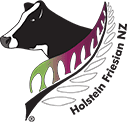He might have had his fair share of media attention recently for coming runner up in the 2022 FMG Young Farmer of the Year, but Waikato’s Chris Poole has many more strings to his bow.
Farming at the base of Mount Pirongia on 202ha, with wife Emma and son Beau, the couple not only split calves 720 cows, but runs a successful calf-rearing business as well.
They bought a herd of 165 Holstein Friesian cows from breeders Murray and Julie Dickson in May 2022, looking to breed higher-producing cows in order to reduce cow numbers.
“Emma and I are real fans of their animals, having bought bulls from them previously,” Chris says.
“We DNA tested those bulls and ran them with the heifers. We monitored the progeny in the herd from the natural bulls, and they were better than most of the cows in the herd.”
Chris says they were “stoked” when the opportunity came up to buy the herd.
“We know they suit the system well,” he says. “We sold the bottom 165 cows of our own herd to accommodate the new cows.”
The couple is in an equity partnership with Chris’ parents John and Anne. Chris and Emma were both “keen farm kids”, Chris brought up on a Taranaki dairy farm, and Emma a calf rearing farm near Auckland.
Chris was about 10 years old when John and Anne bought the Pirongia farm. He went to boarding school at Sacred Heart College in Auckland City from year nine, a school he loved.
Chris attended Massey University to study Agricultural Science, meeting Emma, a veterinary student, in 2014 through Massey University Young Farmers.
Chris graduated in 2016 and headed back to the family farm, and the couple married just before the country went into lockdown in March 2020.
Today, the couple split calves 720 cows in spring and autumn. Chris is fulltime on farm, in addition to a part time role as Customer Success Manager a few hours a week at Connecterra cow collars. Emma, currently on maternity leave with their son Beau, 6 months, works as a veterinarian for Vetora.
The couple also run a successful calf-rearing business, rearing around 1,000 calves each year: 850 are beef calves, and 150 are heifer replacements. They buy in beef calves to top up the numbers.
Mating is undertaken in June for eight weeks, and then in October for eight to nine weeks. All mating is AI, using sexed semen to get “next to no bobbies”. Chris says they aim to breed a medium-sized cow, as there is a long walk to the cowshed.
“We aim to breed 500kg cows that can produce more than their liveweight,” Chris says. “Traits we breed for include longevity, efficiency, udders, fertility BV, and fat and protein.”
Having bought the well-bred Dickson herd, they will look to improve herd quality to be able to milk fewer cows with higher production.
“We’re trying to get genetic gain by breeding from our best cows,” Chris says. “We’ve bought a really well bred, top herd so we’ll be able to reduce the total number of cows we’ll be milking.”
Choosing the Holstein Friesian breed has been key for milk production capability.
“We’ve always liked Friesian cattle, although we do still have crossbreeds in the herd,” Chris says. “With the Dickson cows, we will keep as many straight Holstein Friesian as possible. We can get a lot of value from the calves and do a lot better out of them. Holstein Friesian calves are worth rearing and are so much easier to rear.”
Chris says their system is designed to fully feed the herd, year-round. Once herd numbers are reduced, they will put the same amount of feed into fewer, better-producing cows.
“We are a system 5 farm, growing maize and lucerne on farm,” he says. “Most supplements are grown on farm and fed on the feed pad year-round.”
Chris’ name has been on everyone’s lips recently for coming runner up in the 2022 FMG Young Farmer Competition. He competed against – and came second to – his brother-in-law, Tim Dangen. Emma was a 2019 Grand Finalist in the competition.
“I had a lot of fun and met a lot of good people during the contest,” Chris says. “It is a good opportunity to do something a little bit different. All the on-farm skills you practice every day are put to the test – it’s cool competing for something you do every day.”
With the Dickson cows now settled into the herd, Chris says they’ll rear fewer beef calves and more replacements, with a view to sell the surplus replacements each year.
“Rearing more dairy replacements, we will get to pick the best ones for ourselves and get the farm into a place that’s easier to run, and milk a few less cows,” he says.
“We’d love to be more self-sufficient and rely less on off-farm feed.”
The couple has also done some embryo transfer work this year in their beef cattle, as well as in some of their best dairy cattle for themselves and other breeders.
Chris says his lifelong goal is to create a business that’s financially and environmentally stable, to enable a bit of freedom to dabble in some side projects they enjoy – such as breeding, stud animals or some other ‘fun’ animal things.

FARM FACTS
| Owners | Chris & Emma Poole trading as Cloverlea Farm Ltd |
| Location | Pirongia, Waikato |
| Farm size | 202ha |
| Cows | 720 cows (165 registered Holstein Friesian) |
| Production | 550kgMS/cow |
| Stud name | Poole |


Add a Comment
You must be logged in to post a comment